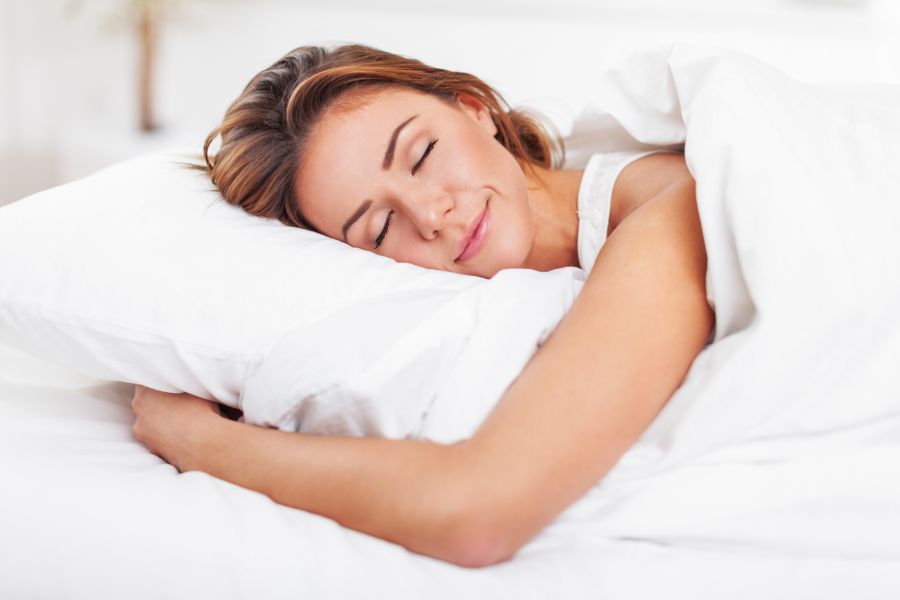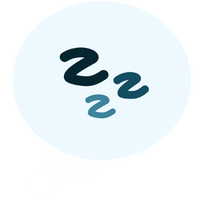Today, people sacrifice their sleep at the expense of productivity. But still, one question persists: Do women require more shut-eye than men?
Well, as the delicate balance between family, work, and personal life responsibilities hangs on a tightrope. It’s more important (than ever) to unravel the potential difference in sleep patterns between genders.

This guide dives into the realm of sleep, exploring scientific evidence and biological factors that can help us answer the question above.
So, stick with us, because you’re in for a fascinating journey.
Reasons Women Need More Sleep Than Men
1. Menstruation
According to research, boys’ and girls sleep habits diverge at puberty. Most girls start menstruating between the ages of ten to fifteen. That marks the beginning of a lifelong cycle of hormonal fluctuations that affect sleep.
In the week preceding a period, a woman’s body releases higher levels of progesterone. This hormone prepares the body for a potential pregnancy.
When the pregnancy doesn’t occur, progesterone levels decrease drastically, triggering the menstrual cycle. The dramatic decrease in progesterone might cause one to find it difficult to fall asleep.
During menstruation, most women complain of cramps, headaches, and bloating. These conditions might affect sleep quality at night and cause increased levels of daytime grogginess and sleepiness.
Similarly, women with severe PMS frequently reported struggling with sleeplessness, nightmares, and fatigue.
Women struggling with PCOS usually have irregular periods characterized by low progesterone levels and higher testosterone.
These hormonal irregularities might cause sleep difficulties. Further still, studies have reported that women with PCOS are at a higher risk of developing sleep apnea.
2. Pregnancy
Research conducted by the National Sleep Foundation shows that 30% of pregnant women and 42% of postpartum women rarely get a good night’s sleep.
More studies showed that 28% of women in their second-trimester sleep for less than seven hours every night. Even worse, the quality of sleep reduced as they approached their third trimester.
Pregnancy causes a lot of changes in a woman’s body. These changes might affect sleep duration, breathing when sleeping or increase the risk of restless leg syndrome.
For example, 75% of reflux. Oftentimes, this condition worsens as the pregnancy progresses and disrupts nighttime rest.
Additionally, as the uterus grows, the body starts to prepare for delivery. Because of this, the body can experience high-stress levels, which can cause sleep disruptions.
But there’s more:
Hormonal changes during pregnancy also alters the quality of sleep you receive. The secretion of estrogen and progesterone increases exponentially during pregnancy. These hormones affect both the circadian clock and sleep hemostasis.
Further still, changes in iron and folate metabolism during pregnancy have been reported to increase the risk of restless leg syndrome among pregnant women.
3. Menopause
Peri-menopause
Many women experience sleep problems during perimenopause – the period before menopause when hormone levels and menstrual periods become irregular.
These hormonal fluctuations cause night sweats and hot flashes which can wake up the sleeping brain. Moreover, lower progesterone levels make some women irritable and unable to relax. As a result, these women might find it hard to go back to sleep.
These sleep problems will persist throughout the menopausal transition and post-menopause. Studies showed that almost 50% of post-menopausal women deal with sleep disorders.
Menopause
Menopause is a crucial stage in a woman’s life. It’s characterized by a lack of menstruation for at least one year and loss of fertility. Reason being, the body stops producing estrogen and progesterone.
Progesterone may affect breathing by preventing the relaxation of the upper airways. The absence of this hormone may also cause lapses in breathing associated with obstructive sleep apnea.
Estrogen, on the other hand, plays a part in the metabolism of serotonin and other neurotransmitters that affect the sleep/wake cycle. It also helps regulate your body temperature at night, making it easier to sleep.
With low estrogen levels, women may experience higher body temperatures and poorer sleep quality. They may also become crankier and have poorer moods since estrogen has an antidepressant effect.
Here’s something you didn’t know:
After menopause, women require to take more time to fall asleep. Also, they become more susceptible to sleep disorders, including sleep apnea and sleep-onset insomnia.
To combat the effects of menopause, women often go for Estrogen Replacement Therapy or Hormone Replacement Therapy. These treatments involve boosting your estrogen and progesterone.
Health specialists might also recommend foods rich in soy, which is high in phytoestrogen. This chemical mimic the effects of estrogen in the body, helping to reduce hot flashes and night sweats.
It also helps to avoid eating spicy food before bed and wear light clothing to bed to reduce the risk of hot flashes.
Sleep Issues That Affect Women More Than Men
1. Restless Leg Syndrome (RLS)
Restless leg syndrome causes a tingling sensation in your legs when you lie down. It makes you want to move your legs around to reduce the discomfort.
Research shows that women are twice as likely to suffer from RLS as men. And because the symptoms can only be relieved by moving your legs around, many women who suffer from RLS have difficulty falling asleep.
Furthermore, RLS can cause daytime sleepiness and depression due to sleep deprivation. These conditions can make it even harder to get quality sleep.
However, the primary cause of RLS is iron deficiency. Therefore, anyone struggling with RLS should maintain a diet rich in iron to manage this condition. Iron supplements, potassium, and vitamin D3 can also help people deal with RLS.
2. Insomnia
Insomnia is difficulty in falling or staying asleep. Anyone having insomnia always struggles to get through the day because they feel exhausted all the time.
Did you know women are 40% more likely to struggle with insomnia than men?
Women are prone to insomnia due to hormonal changes associated with menstruation, pregnancy, or menopause. These changes often affect their sleep/wake cycles.
Similarly, a woman struggling with any form of mood disorder is highly likely to struggle with insomnia or other sleep-related problems.
Dealing with insomnia often requires better sleeping practices. You need to keep a regular bedtime schedule and create a conducive sleep environment.
You can achieve this by setting alarms or timers to remind you of your bedtime. Also, having a cool dark room will help you sleep faster.
Furthermore, if you’re an avid coffee drinker, it’s advisable to reduce your coffee intake, especially before bedtime. Also, avoid taking alcohol or any alcoholic beverages.
3. Nocturnal Sleep-Related Eating Disorders (NS-RED)
Sleep-related eating disorders are normally characterized by abnormal eating patterns at night. Although uncommon, you might experience NS-RED while sleepwalking.
NS-RED is a condition where a person might eat food while asleep but cannot remember anything upon waking up. If one suffers from chronic NS-RED, they’re likely to experience weight gain or increase their chances of developing type 2 diabetes.
Research shows that women are more prone to suffer from NS-RED than men. Additionally, people who struggle with sleep-related disorders usually have a prior history of alcoholism and drug abuse or struggled with a different sleep disorder.
With recurrent NS-RED, women might develop insomnia due to sleep disruption caused by repeated nighttime eating episodes. Due to a lack of restorative sleep because of this condition, there are always complaints of daytime fatigue and crankiness.
But, fear not, with proper medication and lifestyle changes, NS-RED becomes manageable. For example, reducing caffeine and alcohol intake before bedtime will improve the quality of sleep you receive and prevent this condition.
Additionally, therapy and stress management techniques might come in handy. You could also try your hand at meditation before bedtime to help you wind down.
4. Pain
Pain-related sleep problems are prevalent among women. Any sort of pain makes it difficult to get comfortable in bed. It also makes it a challenge to fall and stay asleep.
You might find yourself tossing and turning, trying to find the perfect position that will ease the pain and prevent its persistence during the day.
Some conditions associated with chronic pain like fibromyalgia are highly likely to affect women than men.
Most treatments for pain-related sleep problems focus on alleviating the pain and improving sleep quality. For example, combining therapy, lifestyle changes, and relaxation techniques might help relieve the pain and reduce your sleep difficulties.
What Happens When Women Don’t Sleep Enough?
Weight Gain
In most cases, sleep deprivation at night is directly associated with an increase in weight. When a person is sleep deprived, the body releases higher amounts of cortisol (stress hormone) into the bloodstream.
With more cortisol in the system, a person will generally develop a bigger appetite. A bigger appetite and lethargy imply that you have no room to burn off the excess fat you gain from eating more. Thus, promoting weight gain.
Stress and Anxiety
A good night’s sleep regulates the amount of cortisol in the body. Cortisol is a key hormone in maintaining your regular sleep patterns.
When you wake up, your cortisol levels spike up momentarily while melatonin production reduces. This helps you to stay awake and feel refreshed. However, sleep deprivation at night causes a spike in cortisol levels and a decline in melatonin production.
Elevated cortisol levels negatively impact your sleep. This often results in stress and daytime fatigue. The more stressed a person is, the more cortisol is released into the bloodstream.
Since women are more prone to the effects of stress, this increases the production of cortisol in the body and, in turn, a higher risk of sleep disruption and deprivation. Thus, begins the long-lasting cycle of insomnia, stress, and fatigue.
Tips to Improve the Quality of Your Sleep

Keep A Regular Bedtime Schedule
Going to bed at different times affects the quality of sleep you get. Establishing a consistent sleep schedule and routine will benefit your circadian rhythm and, in turn, improve your sleep.
To achieve this, try setting a constant reminder or alarm to stop everything you’re doing and prepare for bed. Having a consistent time for lights out and going to bed will help you create a bedtime routine.
Sticking to a routine will help you stay accountable to your sleep schedule at night and reduce any sleep debt you might have accumulated over time.
Reduce Exposure to Screens Before Bedtime
Using light-emitting electronic devices before bedtime often affects the quality of sleep you get. Exposure to these lights suppresses the production of melatonin and increases your brain alertness. This disrupts your sleep cycle and affects the quality of sleep you receive.
Melatonin is often referred to as the sleep hormone. It promotes healthy rest and regulates your body’s circadian rhythm. Therefore, to make it easier to fall asleep, avoid using laptops, tablets, or phones in bed.
Watch Your Eating Habits
Your eating habits and diet might have a direct effect on the quality of sleep you have. As a rule of thumb, one should avoid eating at least three hours before bedtime. It reduces the chances of developing heartburn, thus improving the quality of your sleep.
Furthermore, what you eat also matters. Some foods, especially spicy foods, can cause acid reflux, which can be exacerbated by lying down. Spicy foods might also increase your body temperature, making it harder to fall asleep.
Eating foods with added sugar and refined carbs will raise your blood sugar. Hence, you might experience restless sleep, night sweats, and headaches. You might also find yourself urinating frequently throughout the night, which disrupts your sleep cycle.
High caffeine and alcohol consumption might also affect the quality of sleep you get. Therefore, if you’re trying to sleep more, refrain from drinking either of the two.
Have A Wind-Down Routine Before Going to Bed
There are several relaxation activities you can perform to help you relax your body and ease your mind before going to bed, promoting a good night’s sleep. They include:
- Light stretching or yoga
- Reading a book
- Meditation or breathing techniques
- Taking a warm bath before bed
Create A Sleep Conducive Environment
Your sleep environment is crucial to the sleep quality you get. It is also an important part of sleep hygiene. Below, we’ve discussed a few critical points to consider when creating a proper sleep environment.
- Keep your room at a comfortable temperature–not too hot or too cold. The ideal range is between 60-67 degrees Fahrenheit.
- Avoid electronics or any blue light-emitting devices in your sleeping space.
- Keep your room quiet. This is critical, especially if you live in an area prone to noise disturbances through the night. You can block the noise using a fan or a white noise machine.
- Always keep your bedroom dark when you’re trying to fall asleep.
Read More: Is 8 Hours of Sleep Enough?
Conclusion
Without a doubt, everyone needs a quality good night’s sleep. But women require more sleep than men for several reasons.
For instance, women dealing with period cramps and other side effects might have a difficult time sleeping. But, if they don’t receive sufficient amounts of sleep, they might become groggy and experience daytime sleepiness.
Besides menstruation, pregnancy, and menopause affects the quality of sleep women enjoy at night. As a result, they are more susceptible to sleep disorders like insomnia, RLS, and NS-RED.
To reduce the risk of developing these conditions, women might need to sleep for longer hours than men.
But remember, sleep quality and duration vary based on several factors, including age, lifestyle, and genetics. So, no two women have the same sleep needs. Therefore, you need to determine your body’s sleep need to enjoy quality slumber at night.
